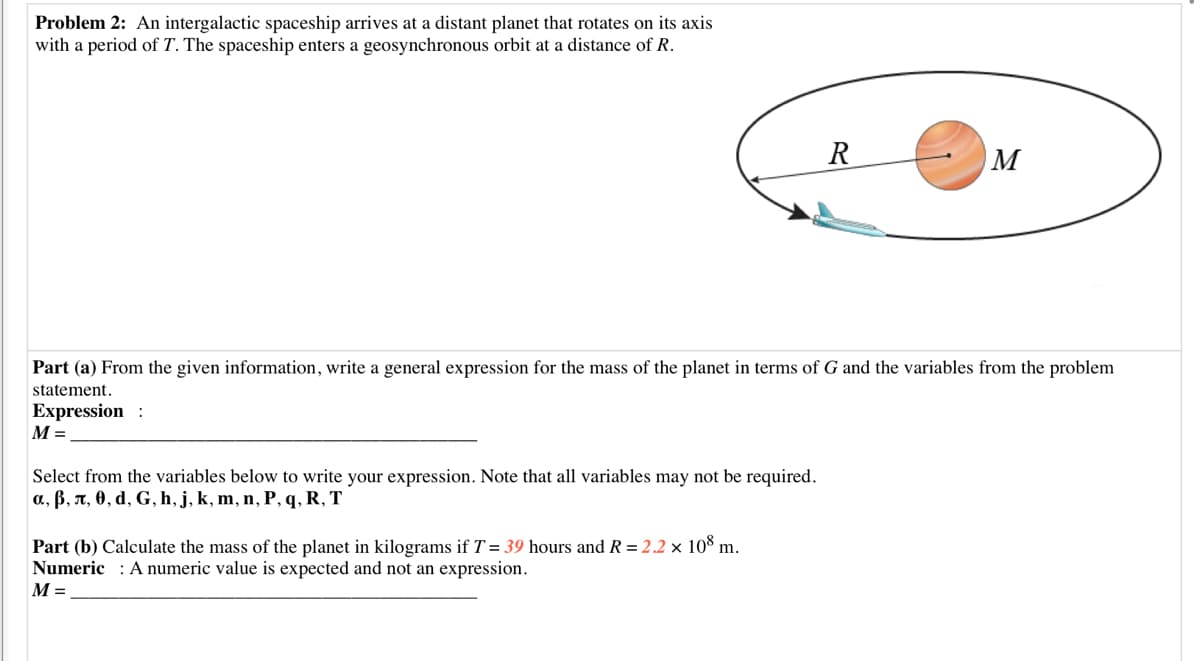Problem 2: An intergalactic spaceship arrives at a distant planet that rotates on its axis with a period of T. The spaceship enters a geosynchronous orbit at a distance of R. R M Part (a) From the given information, write a general expression for the mass of the planet in terms of G and the variables from the problem statement. Expression : M = Select from the variables below to write your expression. Note that all variables may not be required. a., B, n, 0, d, G, h, j, k, m, n, P, q, R, T Part (b) Calculate the mass of the planet in kilograms if T = 39 hours and R = 2.2 x 10% m. Numeric : A numeric value is expected and not an expression. M =
Problem 2: An intergalactic spaceship arrives at a distant planet that rotates on its axis with a period of T. The spaceship enters a geosynchronous orbit at a distance of R. R M Part (a) From the given information, write a general expression for the mass of the planet in terms of G and the variables from the problem statement. Expression : M = Select from the variables below to write your expression. Note that all variables may not be required. a., B, n, 0, d, G, h, j, k, m, n, P, q, R, T Part (b) Calculate the mass of the planet in kilograms if T = 39 hours and R = 2.2 x 10% m. Numeric : A numeric value is expected and not an expression. M =
University Physics Volume 1
18th Edition
ISBN:9781938168277
Author:William Moebs, Samuel J. Ling, Jeff Sanny
Publisher:William Moebs, Samuel J. Ling, Jeff Sanny
Chapter13: Gravitation
Section: Chapter Questions
Problem 88CP: Find the Hohmann transfer velocities, vEllipseEarth and vEllipseMars ,needed for a trip to Mars. Use...
Related questions
Question
Gravitation Q2: Please answer all parts and explain all reasonings for each step (even if minor)

Transcribed Image Text:Problem 2: An intergalactic spaceship arrives at a distant planet that rotates on its axis
with a period of T. The spaceship enters a geosynchronous orbit at a distance of R.
R
M
Part (a) From the given information, write a general expression for the mass of the planet in terms of G and the variables from the problem
statement.
Expression :
M =
Select from the variables below to write your expression. Note that all variables may not be required.
a., B, n, 0, d, G, h, j, k, m, n, P, q, R, T
Part (b) Calculate the mass of the planet in kilograms if T = 39 hours and R = 2.2 × 10° m.
Numeric : A numeric value is expected and not an expression.
M =
Expert Solution
This question has been solved!
Explore an expertly crafted, step-by-step solution for a thorough understanding of key concepts.
This is a popular solution!
Trending now
This is a popular solution!
Step by step
Solved in 3 steps

Knowledge Booster
Learn more about
Need a deep-dive on the concept behind this application? Look no further. Learn more about this topic, physics and related others by exploring similar questions and additional content below.Recommended textbooks for you

University Physics Volume 1
Physics
ISBN:
9781938168277
Author:
William Moebs, Samuel J. Ling, Jeff Sanny
Publisher:
OpenStax - Rice University

Physics for Scientists and Engineers: Foundations…
Physics
ISBN:
9781133939146
Author:
Katz, Debora M.
Publisher:
Cengage Learning

Classical Dynamics of Particles and Systems
Physics
ISBN:
9780534408961
Author:
Stephen T. Thornton, Jerry B. Marion
Publisher:
Cengage Learning

University Physics Volume 1
Physics
ISBN:
9781938168277
Author:
William Moebs, Samuel J. Ling, Jeff Sanny
Publisher:
OpenStax - Rice University

Physics for Scientists and Engineers: Foundations…
Physics
ISBN:
9781133939146
Author:
Katz, Debora M.
Publisher:
Cengage Learning

Classical Dynamics of Particles and Systems
Physics
ISBN:
9780534408961
Author:
Stephen T. Thornton, Jerry B. Marion
Publisher:
Cengage Learning

Glencoe Physics: Principles and Problems, Student…
Physics
ISBN:
9780078807213
Author:
Paul W. Zitzewitz
Publisher:
Glencoe/McGraw-Hill